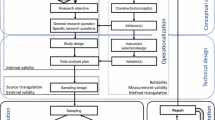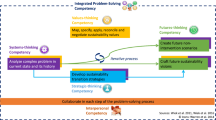Abstract
Readers are invited to imagine students helping to solve real-world sustainability problems brought to them by societal stakeholders and simultaneously learning about and contributing to sustainable changes in society. Effective sustainability research education engages students in just that. Higher education institutions are implementing this vision of education in entire curricula, individual courses, and extracurricular research activities. In this article, we build on the literature to describe a vision of sustainability research education and present an evaluative scheme for measuring its effectiveness. We apply the scheme to two sustainability research-education projects in Switzerland to test its applicability and to identify achievements of the projects and the areas where improvement is needed. Areas for improvement include collaboration between academics and practitioners, joint problem definition, and the guidance of students to participate successfully in collaborative, real-world projects.

Similar content being viewed by others
Notes
For details about these efforts, please see: http://www.ulsf.org/resources_sust_degrees.htm, http://sustainabilityscience.org/curriculum.html, http://schoolofsustainability.asu.edu/degrees/index.php, http://www.sustainability.k.u-tokyo.ac.jp/, http://www.lucsus.lu.se/html/education_at_lucsus.aspx, http://www.icis.unimaas.info/education/must/, http://www.sustain.ubc.ca/.
A peer review process is common practice in academia to ensure credibility of an academic contribution. The “extended peer-review” refers to the same process, but it includes non-academic experts such as stakeholders and decision-makers in the review process to ensure credibility, legitimacy, and salience of the academic and practical contribution.
Ingredient branding is a marketing concept. It means that an ingredient or component is added into an existing product (e.g., GoreTex in outdoor clothing; NutraSweet in diet soft drinks). The ingredient brand has its own brand identity to promote its special features. The inclusion of an ingredient in an existing product improves the existing product. The question then is how to market the improved product. In general, companies strive to relate the ingredient brand to the brand of the initial product to market the improved version. In doing so they hope to tap into customers’ brand awareness of the initial product and of the ingredient.
References
Alvarez, A., & Rogers, J. (2006). Going “out there”: Learning about sustainability in place. International Journal of Sustainability in Higher Education, 7(2), 176–188. doi:10.1108/14676370610655940
Arizona State University School of Sustainability (n.d.). Challenge the world: Degrees of study. Retrieved August 3, 2010 from: http://schoolofsustainability.asu.edu/degrees/index.php
Brundiers, K., Wiek, A., & Redman, C. (in press). Real-world learning opportunities in sustainability – From classroom into the real-world. International Journal for Sustainability in Higher Education.
Calder, W., & Clugston, R. (2003). International efforts to promote higher education for sustainable development. Planning for Higher Education, 31(3), 30–44.
Calder, W., & Clugston, R. (2005). Education for a sustainable future. Journal of Geography in Higher Education, 29(1), 7–12. doi:10.1080/03098260500030231
Corcoran, P. B., & Wals, A. E. J. (2004). Higher education and the challenge of sustainability: Problematics, promise and practice. Dordrecht, The Netherlands: Kluwer.
Cortese, A. D. (2003). The critical role of higher education in creating a sustainable future. Planning for Higher Education, 31(3), 15–22.
Elder, J. L. (2008). Think systemically, act cooperatively. Reaching the tipping point for the sustainability movement in higher education. Sustainability, The Journal of Record, 1(5), 319–328. doi:10.1089/SUS.2008.9930
Federal Office of Spatial Development [Bundesamt für Raumentwicklung, ARE] (2008). Sustainable Development Strategy: Guidelines and Action Plan 2008–2011. Bern, Switzerland: Federal Office for Spatial Development (ARE) Sustainable Development. Retrieved June 5, 2010, from: http://www.are.admin.ch/dokumentation/publikationen/00014/index.html?lang=en
Fien, J. (2002). Advancing sustainability in higher education: Issues and opportunities for research. International Journal of Sustainability in Higher Education, 3(2), 243–253. doi:10.1108/14676370210434705
Fleischer, T., & Grundwald, A. (2008). Making nanotechnology developments sustainable. A role for technology assessment? Journal of Cleaner Production, 16(8–9), 889–898. doi:10.1016/j.jclepro.2007.04.018
Funtowicz, S. O., & Ravetz, J. R. (1993). Science for the post-normal age. Futures, 25(7), 739–755. doi:10.1016/0016-3287(93)90022-L
Gibbons, M., Limoges, C., Nowotny, H., Schwartzman, S., Scott, P., & Trow, M. (1994). The new production of knowledge. The dynamics of science and research in contemporary societies. London, England: Sage.
Grunwald, A. (2004). Strategic knowledge for sustainable development: The need for reflexivity and learning at the interface between science and society. International Journal of Foresight and Innovation Policy, 1(1–2), 150–167.
Healey, M. (2005). Linking research and teaching to benefit student learning. Journal of Geography in Higher Education, 29(2), 183–201. doi:10.1080/03098260500130387
Hirsch Hardon, G., Bradley, D., Pohl, C., Rist, S., & Wiesmann, U. (2006). Implications of transdisciplinarity for sustainable research. Ecological Economics, 60(1), 119–128. doi:10.1016/j.ecolecon.2005.12.002
Holden, M., Elverum, D., Nesbit, S., Robinson, J., Yen, D., & Moore, J. (2008). Learning teaching in the sustainability classroom. Ecological Economics, 64(3), 521–533. doi:10.1016/j.ecolecon.2007.09.007
Kates, R. W., Clark, W. C., Corell, R., Hall, J. M., Jaeger, C. C., et al. (2001). Sustainability science. Science, 292(5517), 641–642. doi:10.1126/science.1059386
Kueffer, C. (2006). Integrative ecological research: Case-specific validation of ecological knowledge for environmental problem solving. GAIA—Ecological Perspectives for Science and Society, 15(2), 115–120.
Liu, J., Dietz, T., Carpenter, S. R., Alberti, M., Folke, C., et al. (2007). Complexity of coupled human and natural systems. Science, 317(5844), 1513–1516. doi:10.1126/science.1144004
Martin, S. (2005). Sustainability, systems thinking and professional practice. Systemic Practice and Action Research, 18(2), 163–171. doi:10.1007/s11213-005-4156-7
McNall, M., Sturdevant, R. C., Brown, R., & Allen, A. (2009). Brokering community-university engagement. Innovative Higher Education, 33(5), 317–331. doi:10.1007/s10755-007-9052-x
Mezirow, J. (Ed.). (2000). Learning as transformation: Critical perspectives on a theory in progress. San Francisco, CA: Jossey-Bass.
Miller, C. (2001). Hybrid management: Boundary organizations, science policy, and environmental governance in the climate regime. Science, Technology, and Human Values, 26(4), 478–450. doi:10.1177/016224390102600405
Moll, P., & Zander, U. (2006). Managing the interface—from knowledge to action in global change and sustainability sciences. Munich, Germany: Oekom.
Muhar, A., Vilsmaier, U., Glanzer, M., & Freyer, B. (2006). Initiating transdisciplinarity in academic case study teaching: Experiences from a regional development project in Salzburg, Austria. International Journal of Sustainability in Higher Education, 7(3), 293–308. doi:10.1108/146763
Mushakoji, K. (1978). Peace research as internal learning process: A new meta paradigm. International Studies Quarterly, 22(2), 173–194.
Orr, D. W. (1992). Ecological literacy, education and the transition to a postmodern world. Albany, NY: State University of New York Press.
Sammalisto, K., & Lindhqvist, T. (2008). Integration of sustainability in higher education: A study with international perspectives. Innovative Higher Education, 32(4), 221–233. doi:10.1007/s10755-007-9052-x
Steiner, G., & Posch, A. (2006). Higher education for sustainability by means of transdisciplinary case studies: An innovative approach for solving complex, real-world problems. Journal of Cleaner Production, 14(9–11), 877–890. doi:10.1016/j.jclepro.2005.11.054
Robinson, J. (2008). Being undisciplined—Transgressions and intersections in academia and beyond. Futures, 40(1), 70–86. doi:10.1016/j.futures.2007.06.007
Rowe, D. (2007). Education for a sustainable future. Science, 317(5836), 323–324. doi:10.1126/science.1143552
Scholz, R. W., Lang, D., Wiek, A., Walter, A., & Stauffacher, M. (2006). Transdisciplinary case studies as a means of sustainability learning: Historical framework and theory. International Journal of Sustainability in Higher Education, 7(3), 226–251. doi:10.1108/14676370610677829
Stauffacher, M., Walter, A., Lang, D., Wiek, A., & Scholz, R. W. (2006). Learning to research environmental problems from a functional socio-cultural constructivism perspective: The transdisciplinary case study approach. International Journal of Sustainability in Higher Education, 7(3), 252–275. doi:10.1108/14676370610677838
Sterling, S. (2004). Higher education, sustainability, and the role of systemic learning. In B. P. Corcoran & A. E. J. Wals (Eds.), Higher education and the challenge of sustainability: Problematics, promise and practice (pp. 49–70). Dordrecht: Kluwer. doi:10.1007/0-306-48515-X_5
UNESCO, 2003. United Nations decade of education for sustainable development (January 2005–December 2014): Framework for a draft international implementation scheme. Paris, France: UNESCO. Retrieved June 5, 2010, from http://portal.unesco.org/education/en/ev.php-URL_ID=23365&URL_DO=DO_TOPIC&URL_SECTION=201.html
University of British Columbia (n.d.). The SEEDS Program (Social, Ecological, Economic, Development Studies). Retrieved June 17, 2010, from UBC web site: http://www.sustain.ubc.ca/campus-sustainability/getting-involved/seeds
University Leaders for a Sustainable Future (n.d.). Retrieved June 5, 2010, from ULSF.org web site: http://www.ulsf.org/resources_sust_degrees.htm
University of Tokyo (n.d.). Graduate Program in Sustainability Science. Retrieved June 17, 2010 from U-Tokyo web site: http://www.sustainability.k.u-tokyo.ac.jp
van de Kerkhof, M., & Wieczorek, A. (2005). Learning and stakeholder participation in transition processes towards sustainability: Methodological considerations. Technological Forecasting and Social Change, 72(6), 733–747. doi:10.1016/j.techfore.2004.10.002
van Kerkhoff, L., & Lebel, L. (2006). Linking knowledge and action for sustainable development. Annual Review of Environment and Resources, 31(1), 445–477. doi:10.1146/annurev.energy.31.102405.170850
Wals, A. E. J., & Jickling, B. (2002). “Sustainability” in higher education: From doublethink and newspeak to critical thinking and meaningful learning. Higher Education Policy, 15(2), 121–131. doi:10.1016/S0952-8733(02)00003-X
Western Michigan University (n.d.). Environmental Studies Program. Retrieved June 5, 2010, from WMU web site: http://www.wmich.edu/environmental-studies/index.htm
Wiek, A. (2007). Challenges of transdisciplinary research as interactive knowledge generation—Experiences from transdisciplinary case study research. GAIA—Ecological Perspectives for Science and Society, 16(1), 52–57.
Wiek, A., Scheringer, M., Pohl, C., Hirsch Hadorn, G., & Valsangiacomo, A. (2007). Joint problem identification and structuring in environmental research. GAIA—Ecological Perspectives for Science and Society, 16(1), 72–74.
Wiek, A., Brundiers, K., Kueffer, C., & Wülser, G. (2010a). Building real-world sustainability competence in higher education. Working Paper. Tempe, AZ: School of Sustainability, Arizona State University.
Wiek, A., Withycombe, L., & Redman, C. L. (2010b). Key competencies in sustainability—A reference framework for academic program development. Working Paper. Tempe: AZ: School of Sustainability, Arizona State University.
Wiesmann, U., Biber-Klemm, S., Grossenbacher-Mansuy, W., Hirsch Hadorn, G., Hoffmann-Riem, H., et al. (2008). Enhancing transdisciplinary research: A synthesis in fifteen propositions. In G. Hirsch Hadorn (Ed.), Handbook of transdisciplinary research (pp. 433–441). Heidelberg: Springer. doi:10.1007/978-1-4020-6699-3_29
Acknowledgements
The authors would like to thank three anonymous reviewers and Marcia Nation and Kathryn Kyle (Arizona State University) for helpful comments on previous versions of this article. We would like to thank the advisory board of Seed Sustainability, namely Gabriela Wülser, Christoph Kueffer, Thomas Camerata, Renat Heuberger, and Roger Baud, for their long-standing fruitful collaboration with us. Arnim Wiek acknowledges the support of the Swiss NSF grant PA0011-115315.
Author information
Authors and Affiliations
Corresponding author
Additional information
Katja Brundiers
is the Community-University Liaison for the Decision Center for a Desert City and the School of Sustainability at Arizona State University. She received her M.Sc. in Geography from the University of Zürich, Switzerland. Her research interest focuses on the collaboration between scholars and practitioners in the areas of sustainable urban development, decision making under uncertainty, and social processes of integration and segregation.
Arnim Wiek
is an Assistant Professor in the School of Sustainability at Arizona State University. He received his Ph.D. in Environmental Sciences from the Swiss Federal Institute of Technology Zürich and his M.A. in Philosophy from the Free University Berlin, Germany. His research interests include sustainability governance, planning and decision-making related to urban and regional development, land use conflicts, depletion of natural resources, emerging technologies, and climate change.
Rights and permissions
About this article
Cite this article
Brundiers, K., Wiek, A. Educating Students in Real-world Sustainability Research: Vision and Implementation. Innov High Educ 36, 107–124 (2011). https://doi.org/10.1007/s10755-010-9161-9
Published:
Issue Date:
DOI: https://doi.org/10.1007/s10755-010-9161-9




